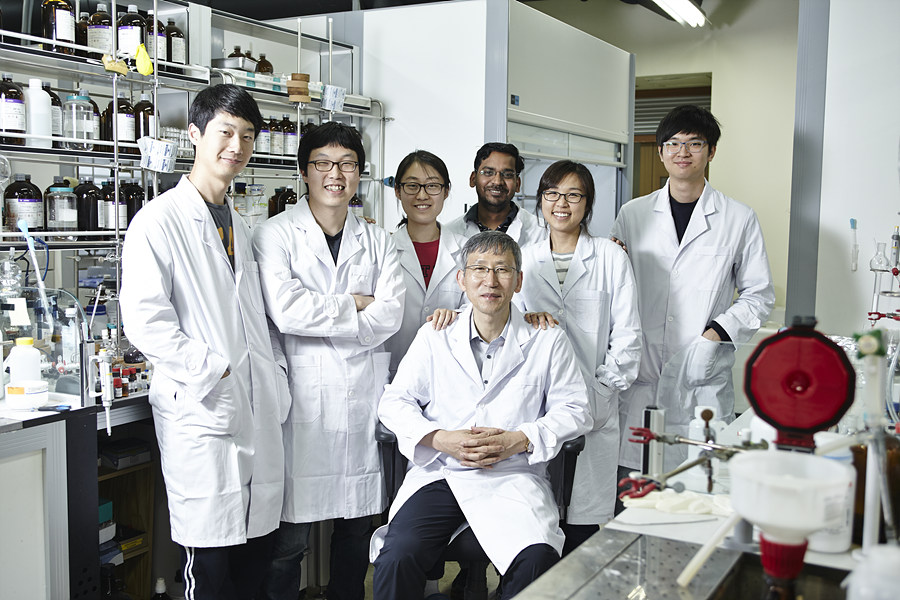주메뉴
- About IBS 연구원소개
-
Research Centers
연구단소개
- Research Outcomes
- Mathematics
- Physics
- Center for Theoretical Physics of the Universe(Particle Theory and Cosmology Group)
- Center for Theoretical Physics of the Universe(Cosmology, Gravity and Astroparticle Physics Group)
- Center for Exotic Nuclear Studies
- Center for Artificial Low Dimensional Electronic Systems
- Center for Underground Physics
- Center for Axion and Precision Physics Research
- Center for Theoretical Physics of Complex Systems
- Center for Quantum Nanoscience
- Center for Van der Waals Quantum Solids
- Chemistry
- Life Sciences
- Earth Science
- Interdisciplinary
- Center for Neuroscience Imaging Research(Neuro Technology Group)
- Center for Neuroscience Imaging Research(Cognitive and Computational Neuroscience Group)
- Center for Algorithmic and Robotized Synthesis
- Center for Genome Engineering
- Center for Nanomedicine
- Center for Biomolecular and Cellular Structure
- Center for 2D Quantum Heterostructures
- Center for Quantum Conversion Research
- Institutes
- Korea Virus Research Institute
- News Center 뉴스 센터
- Career 인재초빙
- Living in Korea IBS School-UST
- IBS School 윤리경영


주메뉴
- About IBS
-
Research Centers
- Research Outcomes
- Mathematics
- Physics
- Center for Theoretical Physics of the Universe(Particle Theory and Cosmology Group)
- Center for Theoretical Physics of the Universe(Cosmology, Gravity and Astroparticle Physics Group)
- Center for Exotic Nuclear Studies
- Center for Artificial Low Dimensional Electronic Systems
- Center for Underground Physics
- Center for Axion and Precision Physics Research
- Center for Theoretical Physics of Complex Systems
- Center for Quantum Nanoscience
- Center for Van der Waals Quantum Solids
- Chemistry
- Life Sciences
- Earth Science
- Interdisciplinary
- Center for Neuroscience Imaging Research(Neuro Technology Group)
- Center for Neuroscience Imaging Research(Cognitive and Computational Neuroscience Group)
- Center for Algorithmic and Robotized Synthesis
- Center for Genome Engineering
- Center for Nanomedicine
- Center for Biomolecular and Cellular Structure
- Center for 2D Quantum Heterostructures
- Center for Quantum Conversion Research
- Institutes
- Korea Virus Research Institute
- News Center
- Career
- Living in Korea
- IBS School
News Center
| Title | IBS conducts performance evaluation for seven research centers | ||||
|---|---|---|---|---|---|
| Name | 전체관리자 | Registration Date | 2018-12-28 | Hits | 866 |
| att. |
 thumb.jpg
thumb.jpg
|
||||
IBS conducts performance evaluation for seven research centers- Center for Catalytic Hydrocarbon Functionalizations evaluated as top-notch - IBS conducted its second annual performance evaluation for seven research centers that have been in operation for five years. The results indicated that the research centers had successfully established themselves in the scientific community. Most centers were at the global level, and some even at a top-notch level or on a par with outstanding research groups of the Max Planck Institute (MPG) in Germany, the Lawrence Berkeley National Laboratory (LBNL) in the U.S., and Harvard Medical School (HMS). At the core of the IBS’ performance evaluation is the quality assessment of research centers. Research creativity and impact, rather than quantitative results based on the number of published papers, are primarily evaluated in a qualitative way. In addition to such scientific excellence, the synergistic effects of collective research through collaboration with other research groups are identified. Consideration is also given to aspects of organizational management such as the construction and use of research infrastructure, the recruiting and nurturing of emerging researchers, etc. Furthermore, the performance evaluation also considers the results of in-depth interviews with various research staff such as research center directors, postdoc researchers, and graduate students. Considering that basic research usually requires a large span of time, the performance evaluation is conducted for research centers that have been active for more than five years since their inception. The evaluation is performed by a panel mainly comprised of distinguished scientists both at home and abroad. In 2018, seven research centers that had been launched between December 2012 and July 2013 were evaluated. The Center for Catalytic Hydrocarbon Functionalizations received “Outstanding,” the highest grade, and the Center for Integrated Nanostructure Physics, Center for Relativistic Laser Science, Center for Neuroscience Imaging Research, Center for Artificial Low Dimensional Electronic Systems, and Center for Underground Physics received “Excellent” grades. In the meanwhile, the Center for Plant Aging Research received a “Very Good” grade and was given a recommendation to create synergies within the center and strengthen collaboration for collective research.
Dr. Hans Wolfgang Spiess, Director Emeritus of the Max Planck Institute for Polymer Research and Chairman of the IBS SEC who oversaw the evaluation, said, “We have been successful in organizing and operating the research centers for the past five years. We should focus more on activating collective research that IBS is aiming at, while establishing and implementing mid- to long-term visions and implementation strategies as well.” Based on the results of the performance evaluation, IBS will prepare a follow-up plan that will enable research centers to identify more focused research topics, strengthen collaboration between groups within each center, and attract and develop excellent postdoc researchers and female scientists, including overseas talents. The plan will be reflected in the operation of research centers with regard to research funds and the allocation of resources.
|
|||||
| before | |
|---|---|
| before |
- Content Manager
- Public Relations Team : Yim Ji Yeob 042-878-8173
- Last Update 2023-11-28 14:20













